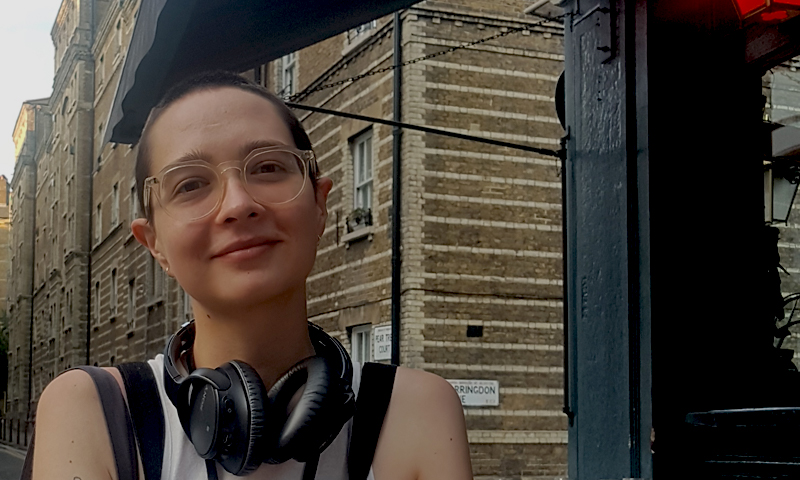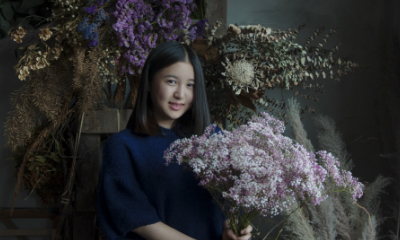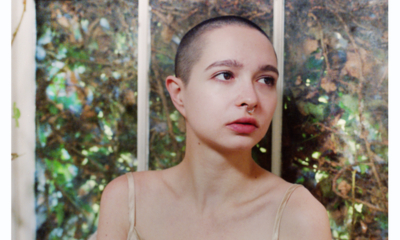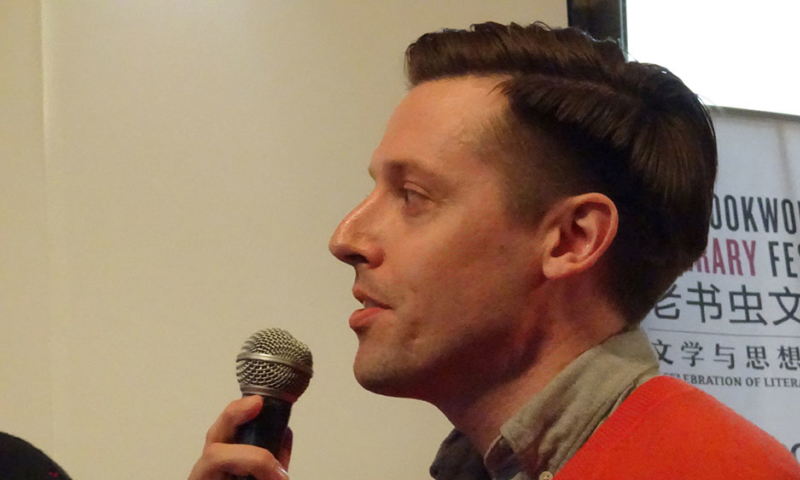
A K Blakemore worked with Dave Haysom to translate poems by Chinese poet Yu Yoyo. Their translations are published in My Tenantless Body published by the Poetry Translation Centre as part of it’s World Poets Series. Blakemore recently won the Ledbury Forte Poetry Prize for her own second full-length poetry collection Fondue (Offord Road Books, 2018). Her work has appeared in publications including The London Review of Books and The White Review. She lives and works in London.
Tice Cin interviewed her at the Betsey Trotwood pub at the end of Yu Yoyo’s UK tour.
How was working with Yu Yoyo and the translation process?
It was really great, I think Dave and I had a nice affinity working together and we were very much on the same page. The concern that superseded all others was wanting to help produce a book of poems that people wanted to read and that felt worthwhile. It was a really interesting process. It was my first sustained project working across months with a translator on a body of work.
It can be easy to rest on your laurels or feel depleted after finishing a creative project of your own [Blakemore had just published her second collection Fondue when this project began], having this experience felt helpful to my practice. The way I thought about poetry while also being able to work with Yoyo’s beautiful ideas, my job was to get inside Yoyo’s ideas and re-inhabit them.
It made me realise the paucity of my own knowledge when it came to the international poetry scene. At the beginning of the process I didn’t know a lot about the traditions Yoyo was working in or what the poetry scene looked like in China. It is something I’m even keener now than I was before to expand my horizons on.
What advice would you give someone who wanted to work with a translator and a poet who speaks a language that you don’t know?
My experience is that poets in different cultural traditions or scenes can be remarkably giving and open to the idea of having people collaborate with them in ways like this. If you know a poet and translator who you’d like to reach out to, then ask them if you can. It would lead to a really healthy interchange among poets if more of us did this. One thing I learnt from the experience, as someone who isn’t bilingual, was to let go, to a certain degree, of a lot of intellectual insecurity and not feeling qualified enough to come on board as someone who isn’t a linguist. I couldn’t even explain to you what the genitive case in English is! But by the end of this project, I felt that it was more important to trust your instincts and affinity to the work as a team. Translation in all its forms is something anyone who has or wants to develop an understanding and thoughtful way of reading poems should feel able to access.
It’s easy to feel imposter syndrome as a young poet…
Absolutely, poetry in the UK and to a certain extent the USA feels very connected to the academic world. It has changed a bit but I feel that can be intimidating to approach as a young person, or you feel a need to posit yourself far away from that tradition and present yourself as something separate. I guess that’s in part why we get the false dichotomy between page and performance poetry: that the page poet traditional thing feels isolating and exclusionary but actually as you experience poetry and become more involved, you learn that everything is to a certain degree hybrid.
Even ‘page poems; will eventually be uttered!
Exactly. I don’t know quite how I shook that off. I suppose in poetry, like anything, it’s the affirmation you receive and maybe to a large part, luck. I’ve had a lot of lucky breaks!
Speaking of imposter syndrome.
It’s hard work but I also think it’s important to acknowledge that I’ve been very lucky.
Sometimes with the ‘page and performance’ dichotomy, there seems to be an anti-intellectualism and an overwhelming suspicion of academia.
It’s strange because in most art forms there isn’t this impression that if one thing exists and it’s doing well, it means nothing else can exist and do well. Nobody thinks that because there’s a thriving death metal scene that nobody is listening to Ed Sheeran anymore.
It is being presented that performance poets from a certain kind of tradition succeeding, comes at the expense of a different kind of poetry. It shouldn’t be presented this way. People enjoy what they enjoy and there’s room for everyone. You’ll find readers. I don’t like it when different traditions are played against each other. I cut my teeth on a few things; my first performance was in this very pub!
I was reading through your collection Fondue recently. For me, when I read your poetry, the ‘I’ feels distant but close. I’m not pre-occupied by whether or not it’s autofiction. I love the way that you seem to slip between speakers.
The surreality of poetry gives you a level of plausible deniability – particularly as women writers, although in poetry maybe we don’t face the same ‘ah but is it autobiography?’ that women prose writers do.
A lot of the writers who influence me, like Emily Berry and Chelsey Minnis have been variously described as belonging to the Gurlesque tradition, of writing by women that thwarts autobiographical readings by intentionally deploying surreal or artificial elements. I’m interested in doing this as well. I think when feeling destroyed or nourished by emotions, that there’s an essential surreality to being a human right now, with technology and the isolation and connection engendered by being a woman in the modern world. The fundamental strangeness of the things that we deal with on a daily basis and how fast things are changing is surreal. It’s easier for me to capture experience by writing about things that feel strange or alien, rather than gritty kitchen-sink realism. It seems easier to get at the experience sideways. It’s kind of like the weird images that pass through your mind when you are half falling asleep, like not quite a dream but not rational thought either. I find it really useful to write when I’m in bed and my boyfriend is snoring really loudly, I’m there but I’m half asleep, and I make notes on my phone that are 80% unintelligible but sometimes a good thing will come out.
These wonderful shifts in register seem to feature in your work. At what point in the writing process does this come up for you – drafting or editing? Something in-between? Is it intrinsic to how you think poetically?
I feel like part of that comes from my obsession with words. The euphony of certain words, how they feel when you say them, or look at them. The resonances they have. Words are a basic unit of expression and this is something I enjoy playing with. Words like ‘dark’ may not be the best specific word, which leads me to use a really weird word as the juiciest word for that particular line. Thesaurus.com is my homepage!
That was one of the biggest challenges in working on Yu Yoyo’s poetry. I’m not a grammarian so I may be getting this slightly wrong, but in English, you can have a noun, like ‘Christmas tree’ and load adjectives on the front of it – the smelly, slow, bad, angry Christmas tree. But in Chinese that would be a very concise expression and occupy a very small space on the page. One of our concerns was working out how to retain the depth of expression and the richness of the idea while also keeping the poems short, delicate and concise and they were. A priority was to think about the aesthetics of how things look on the page, and their weight – their lightness in the case of Yoyo’s poems – and how they were so ephemeral and fragmentary. It felt really important to preserve that, and the spirit of a poem as a whole. As Dave kept saying on our tour, there’s no such thing as a definitive translation. We wanted to make sure that it felt true to the whole spirit of the original, and the mood.
I was thinking of what you just said about deploying artificial elements, and how a lot of your work seems to confidently showcase an understanding of contemporary discussions around technofeminism – even the cover for Fondue seems to be an image of a living doll.
I found that cover from a book in a charity shop and it was just the creepiest thing I had ever seen, I knew I just had to use it for something. We eventually found out it had fallen out of copyright and got it!
Technofeminism is something I’m immersed in. On my breaks at work I am scrolling through Twitter, I’m on Instagram – the arguments and the daily discourses around it are often on my mind. The radical potential of what the Internet can do and will do is yet to be realised.
Especially the feminist Internet!
Exactly! Particularly when you consider the specific cossetedness of the lives of women even 30 years ago, and the potential to connect with each other and to develop our own discourse that the Internet affords. I’m very interested in the performativity of it, social media is at base performative and voyeuristic, I’m very curious about how that intersects with radical politics and womanhood and conventional femininity. Also, in how poetry is performative and “women’s poetry” is performative, including the household names of this like Anne Sexton and Sylvia Plath. The way that these poets are now associated with performative pain…
Sylvia Plath would have been brilliant at Twitter – she basically invented the phrase Basic Bitch, the sharp one-liners are some of the things I remember the most about her poetry, and how this tradition of modern women’s poetry might intersect with the performative politics (pain and confrontation) that we enact on social media.
This is something I find hard to reconcile. It makes it difficult to exist as a poet healthily, in a cyber-climate of performative pain. How do you practice self-care with this in mind?
Plausible deniability! My least favourite thing to be asked in the world by people is, ‘what is your poetry about?’ Shadow self takes over to reply. I think once you publish something and your poetry is out there, it exists independently of you and should. Once it is off my laptop and out in the world, I divorce it – ‘you’re no longer a part of my life’. Nothing is less interesting to me in some ways than the poetry that I have already sent out into the world. ‘That’s not mine anymore, take it away!’ My ability to compartmentalise is basically my self-care. Don’t be too hard on yourself, poetry is such a niche, things can seem cataclysmic in this scene but in the grand scheme of things, it’s all okay.
The Internet has engendered a huge democratisation in the arts, and sometimes this can make you feel like a drop in the ocean but I think the antidote is to keep on writing the things that you like and trust that the rest will come.
It’s unusual too though, that the Internet means a lot of artists are instantly reachable and you can just slide into their dms and tell them how you feel about their work. It can be hard to create distance.
I also have cats and a job outside poetry. One of the things that I value about poetry is that I am able to do it alongside having to support myself as a young person living in London with an office job. Poetry requires very few resources; all I need is something to write on and ten minutes here or there (if I can find it). I don’t need a studio or expensive equipment. It’s a really democratic pursuit. Just dabbling is fine, and in fact great. That’s how everything can start off.
I feel like writers are beset when they have a dry period with this feeling of ‘I will never write again, the well has dried!’ When I read at the Cork poetry festival there was this really cool American poet who was asked how he dealt with dry phases as a poet. He said he’d had dry phases for 4-6 years, and he realised when he returned to his poetry again that all that time off, that’s when the work was really happening. It’s not always easy to subscribe to that, like when you’ve been watching Love Island for the sixtieth night in a row and haven’t even thought about writing. I’m trying to come round to trusting that and also thinking that to have anything worthwhile to say in art you also need to live in the world.
I think that the economics of being a poet should be spoken about more. I have an office job completely not connected to writing poetry, which I spend eight hours every weekday on and so do many poets. The idea of poets having jobs is often viewed as an intellectual curiosity about them, like Philip Larkin being a librarian, T. S. Eliot being a banker, our new poet laureate Simon Armitage used to be a probation officer. It’s viewed as a diverting biographical eccentricity rather than the reality of most people’s lives that you need a job to survive.
Personally, I find that inspiration never really comes from the most predictable sources, very often it’s from a copy of Stylist magazine that I picked up on the tube on the way home rather than a grand vista that I saw on a weekend away. Like I said earlier, poems come at you sideways!
There’s no venue or experience in your life that is absolutely devoid of poetic potential if you embrace that then you can possibly comfort yourself that nothing is ever a complete waste of your time. Even if you feel like it. Even if it’s data entry.
You can buy AK Blakemore’s award-winning collection Fondue from Offord Road Books.
You can purchase My Tenantless Body by Yu Yoyo, featuring translations by Dave Haysom and AK Blakemore form the PTC online shop.




